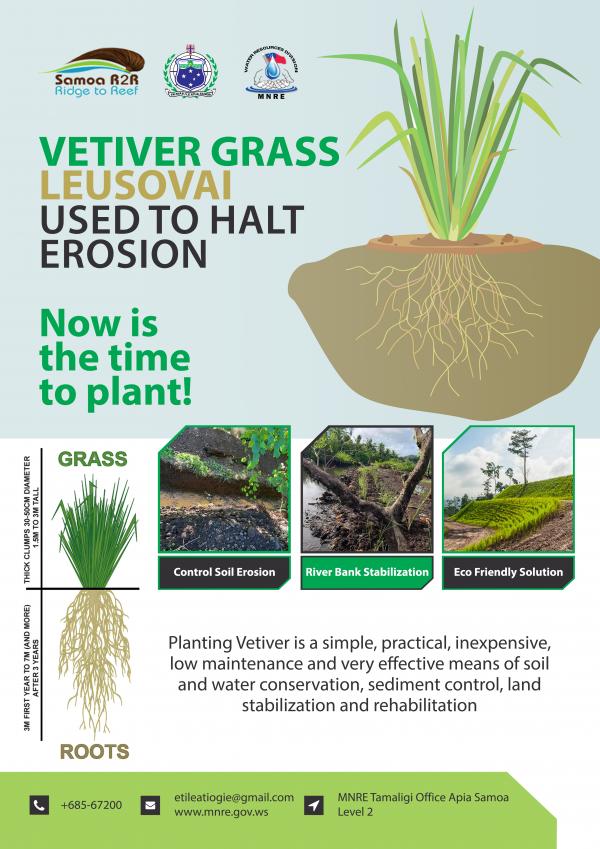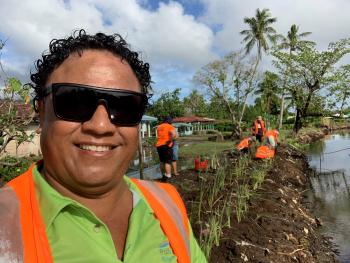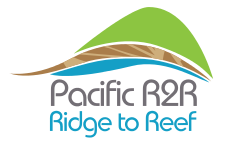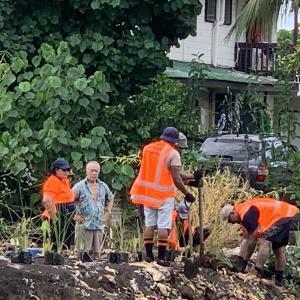
Fagalii River is a critical catchment area, and main water source in Samoa. Located in the capital Apia, increasing population and landuse pressures, are major causes of degradation. Increasing vegetation clearance due to urban expansion and cash cropping in the upper catchments coupled with inadequate waste management in the lower catchments reduce water flow during prolonged dry weather and increasing flash run-off, resulting in erosion, sediment loading and nutrient enrichment of the water courses.
To combat erosion, the Pacific Community’s GEF-funded Samoa International Waters Ridge to Reef (R2R) Project took to the Fagalii river bank in May to plant vetiver grass, which are especially effective in places with warmer climates. Vetiver grass roots grow over 4 meters downward, providing effective soil bioengineering and coastal erosion protection and stabilisation for the stream banks.
Some of the benefits of vetiver grass, include:
- Stiff and erect stems creating dense hedges that can withstand high velocity flows, trap sediment, and control water runoff, protecting against erosion;
- Deep, extensive and interlocking root system that grow vertically reaching depths of 4+ metres, creating dense underground reinforcing root wall structures;
- Strong roots with a tensile strength equivalent to1/6th of mild steel;
- Roots improve soil sheer strength by 45%;
- Thrives in a variety of soils; sandy, sodic, saline, water logged, acidic, alkaline and toxic contaminants;
- Tolerant to climatic and environmental variations; drought, flooding and submergence, and air temperatures of -15C to 55C;
- Roots develop from nodes, if buried, so Vetiver rises with the ground level;
- Roots create favourable conditions for soil microbial activity, which improves soil fertility.
Samoa IW R2R Project Manager Fata Eti Malolo explained that Vetiver (Chrysopogon zizanioides) is a fast growing perennial grass with a vast interlinked root system and strong stems, which together create a miracle plant with the capacity to address a multitude of environmental and engineering needs.
Malolo explained that the application of Vetiver as a bioengineering tool in water-based situations, for stabilisation, protection and disaster mitigation, has been utilised across the world, including Samoa.

“The planting of the vetiver grass at Fagalii is the first trial area of planting this type of grass in Samoa. As a soft solution or nature-based, if successful, will replace the development of hard infrastructure like river walls used in many Pacific Islands,” he concluded.
Former Minister of Agriculture and Fisheries and resident of Fagalii village, Susuga Tuisugaletaua Sofara Aveau explained that the benefits of vetiver were discussed in his time in the Ministry, and that he was elated to finally witness the planting.
Aveau reinforced that vetiver is a simple, low maintenance and effective means of soil and water conservation, sediment control, land stabilization and rehabilitation urging the Government of Samoa and the private sector to continue to promote its use to protect the catchment and sustain communities and their livehoods.
The Samoa IW R2R Project aims to protect the Fagalii Watershed and support community wellbeing and livelihoods in 3 components:
Component 1: Increase knowledge-base and national replications of catchments management planning, to strengthen management links between catchments and coastal areas.
Component 2: Increasing capacity for effective environmental stress reduction practices and sustainable watershed management in Apia.
Component 3: Strengthen support of the National Environment Sector Plan to enhance the mainstreaming of watershed conservation policies in national reporting.






